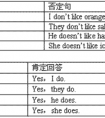按要求改写句子。1. Can you play with me today? (改为肯定句)____________________________________________________________2. I know you. (改为否定句)___________-四年级英语
题文
| 按要求改写句子。 |
| 1. Can you play with me today? (改为肯定句) ____________________________________________________________ 2. I know you. (改为否定句) ____________________________________________________________ 3. This is an apartment. (改为一般疑问句) ____________________________________________________________ 4. I live in an apartment near the park. (就划线部分提问) ____________________________________________________________ 5. It's not far from my school. (写出同义句) ____________________________________________________________ |
答案
| 1. I can play with you today. 2. I don't know you. 3. Is this an apartment? 4. Where do you live? 5. It's near my school. |
据专家权威分析,试题“按要求改写句子。1. Can you play with me today? (改为肯定句..”主要考查你对 肯定句,疑问副词,介词,否定句,一般疑问句 等考点的理解。关于这些考点的“档案”如下:
肯定句疑问副词介词否定句一般疑问句
考点名称:肯定句
- 对事物作出肯定判断的句子叫肯定句。
对事物作出否定判断的句子叫否定句。
结构:主语+谓语+其他
例:Tom played football yesterday afternoon. 汤姆昨天下午打篮球了。
This is my bedroom. 这是我的卧室。 - 肯定句分类:
A、使用“是”字句,也叫判断句。
B、使用一般的肯定句式。 肯定句、否定句、一般疑问句和特殊疑问句的相互转换:
1、有am, is, are的句子,
就划线部分提问(变特殊疑问句)
This is a book.
第一步:变一般疑问句 Is this a book?
第二步:找合适的特殊疑问词 Is this what ?
第三步:特殊疑问词提前放到句首,并大写,其余按顺序照抄,省略划线部分。What is this?2、没有am, is, are的句子,
肯定句变否定句:在主语后面加上do not或者does not,其余按顺序照抄动词用原形
肯定句变一般疑问句:在句首加do或者does并大写,其余照抄。注意:动词用原形
肯定句变特殊疑问句(就划线部分提问):分3步骤
第一步:先变一般疑问句
第二步:找合适的特殊疑问词代替划线部分
第三步:特殊疑问词提前放到句首,并大写,其余按顺序照抄,省略划线部分。
注意:一定先变一般疑问句。但是,如果问的是主语或主语的定语时,语序不变,为"特殊疑问词(+主语)+陈述句"。3、划线部分不能在特殊疑问句中出现。
非单三时用do,单三时用does
非单三:
肯定句:I like English.
一般疑问句:Do you like English?
否定句:I do not like English.
单三 :
肯定句:He likes English.
一般疑问句:Does he like English?
否定句:He does not like English.
就划线部分提问:
I like English.
第一步:先变一般疑问句 Do you like English?
第二步:找合适的特殊疑问词代替划线部分Do you like what?
第三步:特殊疑问词提前放到句首,并大写,其余按顺序照抄,省略划线部分。What do you like?4、特殊:
①some变为any。如:
There are some birds in the tree.→There aren't any birds in the tree.
但是,若在表示请邀请、请求的句子中,some可以不变。如:
Would you like some orange juice?
与此相关的一些不定代词如something, somebody等也要进行相应变化。
②and变为or。如:
I have a knife and a ruler.→I don't have a knife or a ruler.
③a lot of (=lots of)变为many或much。如:
They have a lot of friends.(可数名词)→They don't have many friends.
There is lots of orange in the bottle.(不可数名词)
→There isn't much orange in the bottle.
④already变为yet。如:
I have been there already.→I haven't been there yet.- 肯定句的组织结构:
主系表:eg:I'm a girl.
主谓宾:She write a leter to him.
1.主语+系动词(be)+表语
2.主语+call +宾语+宾语补足语
3.主语+name +宾语+宾语补足语
4.主语+is called +宾语补足语
5.主语+is named +宾语
6.主语+regard +宾语+as +宾语被足语
7.主语+be +no (none)+other than (but)+表语
8.主语+be +nothing +else but (but,else than,less than)+表语
9.It is (was)+强调部分+that (who)+从句
10.主语+感觉动词+表语
11.主句+as if (as though)+从句
12.主语+be +said to be (so-called)+表语
13.主语+be,it is said,+表语
14.So far from being +表语,主语+谓语+其它
15.主语+be +more +表语+than +表语
16.主语+be +less +表语+than +表语
17.主语+be +表语+rather than +表语
18.主语+be +not so much +表语+as 表语
19.主语+be +either +表语+or +表语
20.Either +主语+or +主语+be +表语
考点名称:疑问副词
- 疑问副词:
用来引导特殊疑问句,表示时间,地点,方式,原因等,常见的有:when,where,how,why等。
分类:
时间副词:now, then, yesterday, always, already, soon
地点副词:here, home, upstairs, nowhere, above, near, beyond
方式副词:多数是形容词加上ly构成的,和一些well, fast, quick, slow, hard, alone, straight, wide
在加词尾ly时要注意:
(1)辅音+le:simple→simply, gentle→gently,
(2)以ic结尾的词:classic→classical但是public→publicly
(3)以辅音读音是[i]的y结尾的词:easy→easily
(4)特例:full→fully, whole→wholly, true→truly
程度副词,连接副词,关系副词
much, enough, quite, hardly, almost, deeply
疑问副词连接副词,关系副词:
how,who,where - 疑问副词在句中的位置及用法举例:
由于疑问副词后接疑问句,因此这些副词一般都位于句首。例如:
How do you go to school? 你怎么去上学?
Why do you dislike the game? 为什么你不喜欢这个游戏? - 疑问代词和疑问副词区别:
1. 疑问代词做对陈述句的主语,宾语或定语提问,即做句子的主语,宾语或定语, 如:
what, who/ whom, whose.
eg. Who is talking ?
What can you see?
Whose shirt is this?
2.疑问副词对时间,地点,方式等状语提问,如:
when, where, how 等.
eg. When is your birthday?
Where are you going?
How do you know?
考点名称:介词
- 介词:
是用来表示它后面的名词(代词)或起名词作用的短语、从句与句中其他成分之间的关系。
介词是英语中很活跃的词,一般置于名词之前。它常和名词或名词性词语构成介词短语。
- 最新内容
- 相关内容
- 网友推荐
- 图文推荐
| [家长教育] 孩子为什么会和父母感情疏离? (2019-07-14) |
| [教师分享] 给远方姐姐的一封信 (2018-11-07) |
| [教师分享] 伸缩门 (2018-11-07) |
| [教师分享] 回家乡 (2018-11-07) |
| [教师分享] 是风味也是人间 (2018-11-07) |
| [教师分享] 一句格言的启示 (2018-11-07) |
| [教师分享] 无规矩不成方圆 (2018-11-07) |
| [教师分享] 第十届全国教育名家论坛有感(二) (2018-11-07) |
| [教师分享] 贪玩的小狗 (2018-11-07) |
| [教师分享] 未命名文章 (2018-11-07) |


